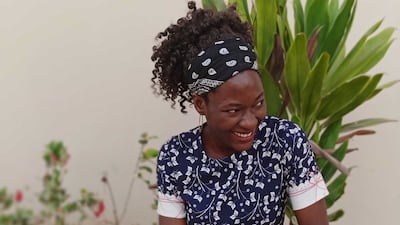Nigerian student Iyunoluwa Ademola-Popoola was supposed to graduate last year from Ibadan University, widely regarded as the best higher education institution in Nigeria.
But when Covid-19 hit, even the prestigious centre of learning in one of Africa's most vibrant nations was not spared as the ensuing pandemic forced the closure of universities in Nigeria and around the world.
Ms Ademola-Popoola, a 21-year-old archaeology student, was one of the hundreds of millions of students stuck at home as the virus spread.
She is also a youth leader for the Global Partnership for Education, the UN-backed fund that works to transform education systems around the world.
Next week, the UK and Kenya will co-host the Global Education Summit in a drive to fully fund GPE and ensure it gets the $5 billion needed to support its work over the next five years. World leaders are urged to back GPE to help transform educations systems in the developing world.
“Fund education. Education really is the bedrock of every society. The more educated a society is, the more developed that society is,” Ms Ademola-Popoola says.
Last month, she returned to the classroom after months of virtual learning. In Nigeria, it was only the private, more technologically developed institutions that were able to provide some form of education during the pandemic.
“It was challenging initially,” she says. “We had been used to the physical interaction in classes.”
Even though Nigeria sometimes has to contend with electricity problems, she says she got used to online learning over time.
But she is delighted to be back and to see her fellow students, even if it is exam season.
“It’s been amazing. I missed the physical interaction," she says. "I think that, because we grew up learning physically, learning was a lot more difficult for us virtually.
“I think my physical classes I had last month were a lot more effective than the ones I had virtually.”
But Ms Ademola-Popoola has a wider message about education in Nigeria and its lack of inclusivity.
She says the system in Nigeria was already flawed but the virus has brought home how serious these issues are.
To help tackle the Covid and non-Covid-related education problems, she says government funding is vital. She also highlights Nigeria's gender imbalance, exacerbated, she says, by the pandemic with a disproportionate effect on girls' education.
“Things got really bad. The economy [was] really affected, things really got expensive. So it’s been difficult for many students to be able to afford basic things.”
She says that many were at risk of dropping out because of the economic effects, while more women were married off for financial purposes and domestic violence rose.
Unicef has said that Covid meant millions more girls were at risk of child marriage – whether it be from school closures, economic fallout, parental deaths and more.
“Girls who marry in childhood face immediate and lifelong consequences. They are more likely to experience domestic violence and less likely to remain in school,” the UN’s children’s agency said earlier this year.
Ms Ademola-Popoola volunteers for OneAfricanChild, an NGO that supports disadvantaged community children, and despite her campaign for a more inclusive education system in Nigeria, any progress made was reversed by the pandemic.
She says females are at greater risk of dropping out of education, while disabled children are also affected.
“Evenc, typically, under the normal system without Covid, the education … wasn’t particularly inclusive for disabled children and girls. With the Covid pandemic, it got worse,” she says.


